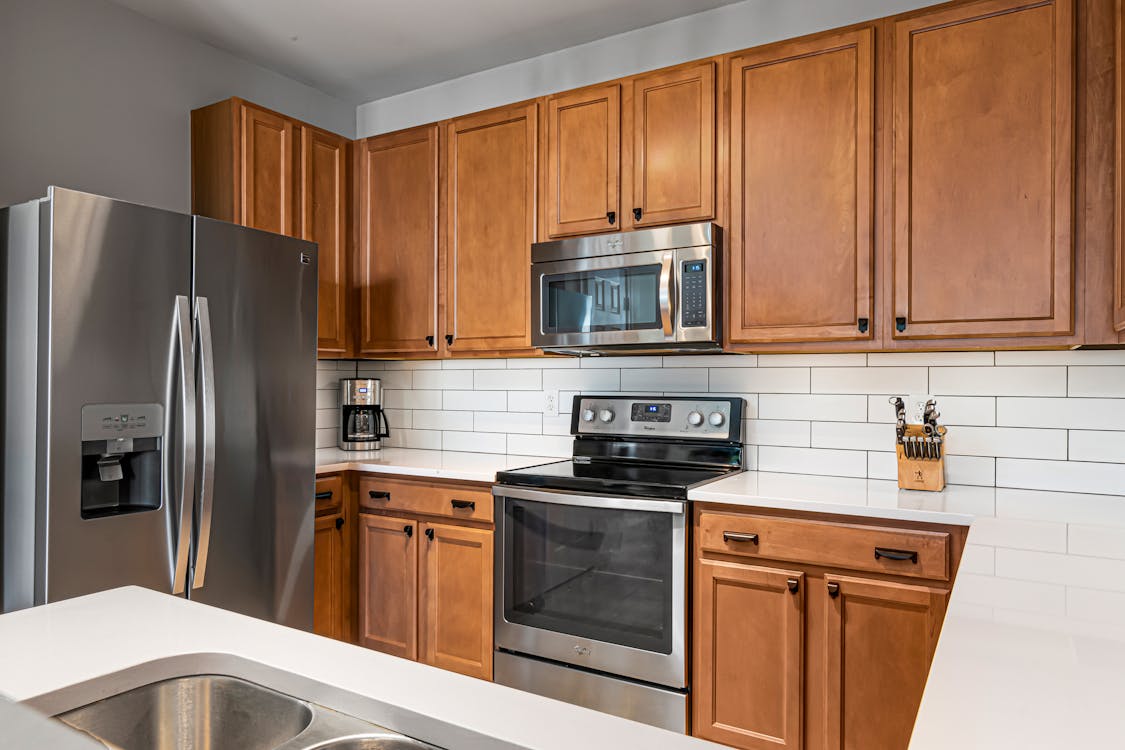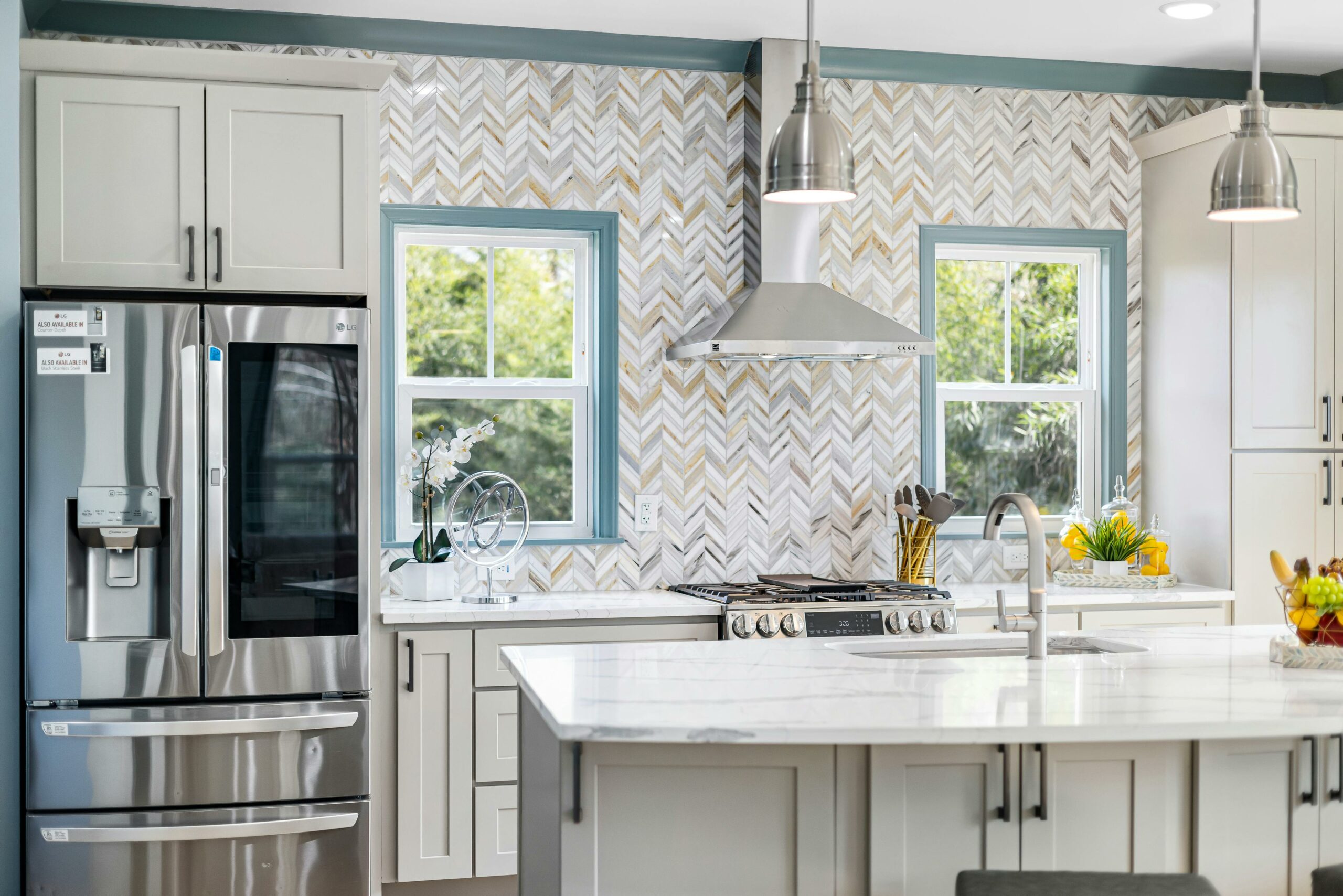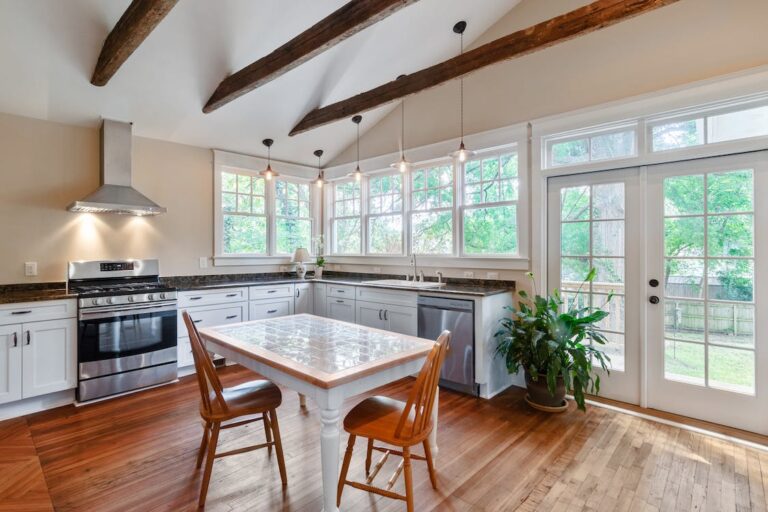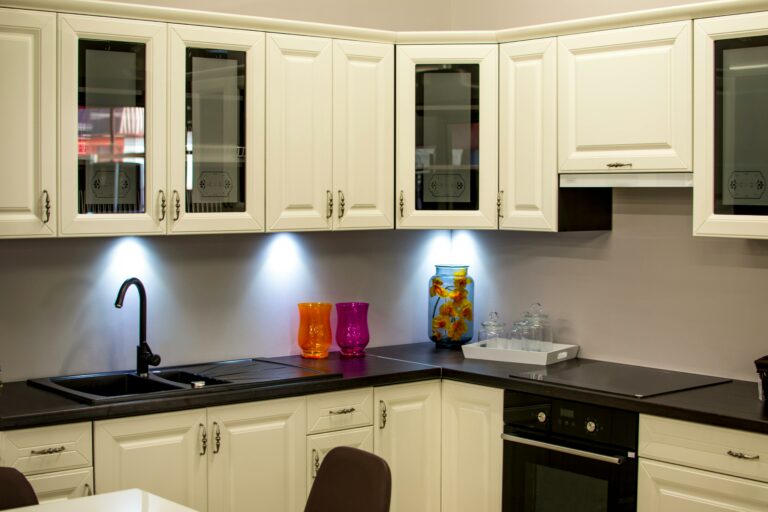Benefits of Smart Kitchen Technology: Enhancing Convenience and Efficiency
Imagine a kitchen that knows exactly what you need and when you need it. A kitchen that anticipates your culinary desires, saves you time, and enhances your overall cooking experience. This is the promise of smart kitchen technology – a revolutionary advancement that is transforming the way we cook and interact with our kitchens.
Smart kitchen technology refers to the integration of connected devices, sensors, and appliances into our culinary spaces, enabling us to automate and simplify various kitchen tasks. From intelligent ovens that cook meals to perfection, to voice-controlled virtual assistants that help you find recipes and create shopping lists, the possibilities are endless.
With the advent of the Internet of Things (IoT) and the rise of home automation, the concept of a smart kitchen has gone from science fiction to reality. Smart kitchen technology is revolutionizing the way we cook, bringing a new level of convenience and efficiency to our daily lives.
Whether you’re a busy professional looking to streamline your cooking process, or a culinary enthusiast seeking to explore new recipes and techniques, smart kitchen technology has something to offer everyone. Let’s take a closer look at the benefits and advantages of embracing this exciting new frontier in the culinary world.
Table of Contents
Market Growth of Smart Kitchen Technology

The market for kitchen appliances has been on a steady rise in recent years, driven by advancements in technology and changing consumer preferences. With the increasing adoption of smart homes and connected devices, the demand for innovative and efficient kitchen appliances is growing. In this section, we will explore the projected market growth and the size of the smart kitchen appliances market. We will also delve into the advancements in wireless sensor networks that are driving this growth.
Projected Market Growth
According to market research, the smart kitchen appliance market is projected to experience significant growth in the coming years. By 2028, it is estimated to reach a staggering $47.21 billion, showing a substantial increase from its value of $13.79 billion in 2020. In 2022, the global smart kitchen appliances market was valued at $15.68 billion. This value is expected to grow at a compound annual growth rate (CAGR) of 18.3%. By 2031, the market is estimated to reach an impressive $138.22 billion, with a CAGR of 12.0%.
Advancements in Wireless Sensor Networks
Wireless sensor networks play a crucial role in the functionality of smart kitchen appliances. These networks enable seamless communication and data exchange between devices, allowing for automation and enhanced user experience. As a result, wireless sensor networks dominate the smart kitchen appliances market, holding a major share of more than 30%[4](insert URL).
The growth potential of the smart kitchen appliances market is undeniable. With technological advancements and increasing consumer demand for convenience and efficiency in kitchen tasks, the market is expected to continue its upward trajectory. Stay tuned as we explore the various aspects of this exciting and rapidly evolving industry.
Benefits of Smart Kitchen Technology

Imagine having a kitchen that anticipates your needs, simplifies your cooking processes, and saves you time and energy. With smart kitchen technology, this is not just a distant dream, but a reality that is revolutionizing the way we cook and interact with our kitchens. Smart kitchen technology offers a range of benefits that enhance convenience, improve efficiency, and promote sustainability. Let’s explore these advantages in more detail:
Enhanced Convenience
Smart kitchen appliance simplifies cooking processes, saving time and optimizing energy consumption. With connected smart devices and appliances, you can control and monitor your kitchen from anywhere, even when you’re not at home. Imagine starting your slow cooker while you’re still at work or preheating your oven on your way back from the grocery store. The convenience of remote accessibility allows you to have a head start on meal preparations, making dinnertime a breeze.
Improved Efficiency
In quick-serve commercial kitchens, consistent taste and streamlined cooking processes are essential. Connected smart devices and appliances in these kitchens provide just that. With smart technology, chefs can achieve the perfect temperature, timing, and cooking methods consistently, ensuring that every dish is prepared to perfection. Machine learning and data collection in smart appliances offer customized functionalities, adapting to your cooking preferences and needs. From personalized recipe recommendations to automated ingredient ordering, smart technology takes the guesswork out of cooking, allowing for a more efficient and enjoyable experience.
Sustainability
The advancements in smart kitchen technology not only benefit us but also contribute to a more sustainable future. Smart refrigerators equipped with cutting-edge features, such as perishable tracking and remote accessibility, improve kitchen efficiency and convenience. With real-time inventory management and expiration date notifications, you can minimize food waste and make better use of your ingredients. Additionally, sensor technology, temperature monitoring, and thermal imaging provide detailed information for enhanced cooking experiences while optimizing energy usage. By reducing unnecessary energy consumption and minimizing wastage, smart kitchen technology promotes sustainability and environmental responsibility.
It is clear that smart kitchen technology offers a wide array of benefits that enhance convenience, improve efficiency, and promote sustainability. From simplifying cooking processes to providing customized functionalities, smart kitchen technology is revolutionizing the way we cook and interact with our kitchens. Embracing these advancements not only enhances our cooking experiences but also contributes to a more efficient and sustainable future. So, why not take advantage of the innovations that smart kitchen technology has to offer? Upgrade your kitchen and experience the future of cooking today!
Market Trends and Adoption

The world of kitchen appliances is evolving rapidly, thanks to advancements in technology and the growing demand for convenience. Smart kitchen appliances, in particular, have been gaining significant traction in recent years. These appliances are not just your ordinary kitchen gadgets; they are equipped with cutting-edge features and connectivity options that revolutionize the way we cook, eat, and manage our kitchens.
Growth in the Smart Kitchen Appliance Market
According to market research, the global market for smart kitchen appliances is projected to grow at a compound annual growth rate (CAGR) of around 14% during the forecast period.
This robust growth can be attributed to several factors:
- Increasing awareness and adoption: More and more consumers are recognizing the benefits of smart kitchen appliances, such as improved efficiency, energy savings, and enhanced convenience. As a result, the demand for these appliances is on the rise across the globe.
- Technological advancements: The integration of cutting-edge technologies, such as Internet of Things (IoT), artificial intelligence (AI), and voice control systems, has made smart kitchen appliances more intuitive and user-friendly. These advancements have paved the way for seamless connectivity and enhanced functionalities.
- Changing lifestyles and preferences: With busy work schedules and hectic lifestyles becoming the norm, consumers are seeking appliances that can simplify their daily tasks. Smart kitchen appliances fit perfectly into this narrative by offering features like remote monitoring, recipe suggestions, and automated meal planning.
Integration of Machine Learning
One of the key features that sets smart kitchen appliances apart from their traditional counterparts is the integration of machine learning. These appliances are capable of learning from user behavior and patterns, allowing them to adapt and offer customized functionalities. Machine learning algorithms analyze data collected from appliance usage, user preferences, and environmental factors to optimize performance and deliver personalized experiences.
With machine learning, smart kitchen appliances can:
- Suggest recipes: Based on past cooking habits, machine learning algorithms can recommend recipes that align with a user’s taste preferences and dietary restrictions.
- Automate cooking processes: Smart appliances can adjust cooking parameters, such as temperature and time, based on user inputs and feedback. This ensures consistent and precise results every time.
- Provide maintenance alerts: Machine learning algorithms can monitor appliance performance and detect any anomalies or potential issues. This enables timely maintenance and reduces the risk of breakdowns.
Rise of Smart Refrigerators
Among the various smart kitchen appliances available in the market, smart refrigerators have witnessed significant growth and popularity. These refrigerators go beyond basic cooling features and offer a range of advanced functionalities, such as:
- Perishable tracking: Smart refrigerators are equipped with sensors that can detect and track the freshness of food items. Users can receive real-time alerts and notifications when certain items are nearing their expiration dates.
- Remote accessibility: With the help of smartphone apps, users can remotely monitor and control their refrigerators. This allows them to adjust temperature settings, check inventory, and even create shopping lists while on the go.
- Integration with voice assistants: Smart refrigerators can be integrated with popular voice-controlled smart assistants like Amazon Alexa or Google Assistant. This enables users to interact with their refrigerators using voice commands, making tasks like adding items to a grocery list hands-free and hassle-free.
In conclusion, the market for smart kitchen appliances is experiencing significant growth, with a multitude of factors driving adoption. As consumers increasingly realize the benefits of these technologically advanced appliances, we can expect further advancements and innovations in the kitchen space. Stay tuned to witness the exciting transformation of our cooking experiences!
Also Read : Creating a Functional Minimalist Home: Practical Tips for First-time Homeowners
Value and Impact of Smart Kitchen Technology

Smart kitchen technology has revolutionized the way we cook, eat, and manage our kitchens. With the integration of intelligent features, these innovative appliances offer a plethora of benefits that go beyond mere convenience. From financial savings to waste reduction and enhanced safety, the impact of smart kitchen technology is profound. Let’s delve deeper into each of these aspects to understand how these advancements are shaping the way we experience our kitchens.
Financial Savings
One of the significant advantages of smart kitchen technology is evident in the financial savings it brings. Through energy optimization and reduced waste, these devices help homeowners save money in the long run. Here’s how:
- Energy optimization: Smart kitchen appliances are designed to be energy-efficient, utilizing precise temperature control and automated timers to reduce energy consumption. This means lower energy bills for homeowners.
- Waste reduction: With features like inventory management and recipe suggestions based on available ingredients, smart appliances can significantly reduce food waste. By utilizing what you already have in your pantry and fridge, you’ll save money by buying fewer groceries and limiting unnecessary waste.
Waste Reduction
Smart kitchen technology also contributes to waste reduction in more ways than one. With its integration of advanced sensors and data collection, here’s how these devices help minimize waste:
- Inventory management: Smart refrigerators equipped with cameras and inventory tracking systems allow you to keep a close eye on the contents of your fridge. This feature prevents the wastage of food items that may go unnoticed otherwise.
- Expiration reminders: Smart appliances can send notifications and reminders when your food is nearing its expiry date. This ensures that you prioritize consuming items before they go bad, reducing unnecessary waste.
- Optimized portion control: Smart cooking appliances can help you prepare the perfect portion sizes, preventing overcooking or excess leftovers. By reducing food waste, you’ll save money and contribute to a greener environment.
Enhanced Safety and Precision
In addition to financial savings and waste reduction, smart kitchen technology offers enhanced safety and precision in our cooking processes. Let’s explore how these appliances take our culinary experiences to the next level:
- Automated temperature control: Smart ovens and stovetops boast precise temperature control, ensuring that your dishes are cooked to perfection without the risk of burning or undercooking. This accuracy eliminates guesswork and ultimately produces consistently delicious results.
- Voice and app-controlled features: The integration of voice assistants and smartphone apps allows for seamless hands-free operation of smart kitchen appliances. From setting cooking timers to adjusting temperatures, these features provide ease and convenience in the kitchen. No more running back and forth to the stove!
- Remote monitoring and alerts: With smart kitchen technology, you can monitor your cooking processes remotely through smart devices. Receive real-time alerts and notifications while you’re away from the kitchen, ensuring that you stay informed and in control.
As smart kitchen technology continues to evolve, its value and impact become increasingly apparent. From financial savings to waste reduction and enhanced safety, these innovative appliances offer a range of benefits that make our culinary experiences more enjoyable and efficient.
Innovation Beyond Appliances

In today’s fast-paced world, innovation is not limited to just appliances. When it comes to the kitchen, there are exciting advancements that go beyond the traditional gadgets we’re familiar with. From innovative storage solutions to integrated kitchen apps, these technological innovations are revolutionizing the way we think about and interact with our kitchens.
Innovative Storage Solutions
One area that has seen significant advancements is kitchen organization. Gone are the days of cluttered countertops and overflowing cabinets. Innovative storage solutions are now available to help maximize space and keep everything neat and tidy. Some of the noteworthy options include:
- Smart Pantry Systems: These high-tech pantry systems use intelligent sensors and automation to keep track of inventory and expiration dates. They can even suggest recipes based on the ingredients available.
- Adjustable Shelving: Say goodbye to wasted space in your cabinets. Adjustable shelving allows you to customize the height and placement of your shelves to accommodate items of all sizes.
- Pull-out Drawers: Deep, dark corners are no longer a challenge with pull-out drawers. These convenient drawers slide out smoothly, making it easy to access items tucked away in the back.
- Sleek Appliance Garages: Keep your countertops clutter-free with appliance garages. These hidden compartments store small appliances like toasters and blenders, keeping them out of sight when not in use.
With these innovative storage solutions, you can transform your kitchen into a functional and organized space, making cooking and meal prep a breeze.
Integrated Kitchen Apps
Innovation in the kitchen doesn’t stop at storage solutions. Integrated kitchen apps are changing the way we approach cooking and recipe management. These apps combine the power of technology with our culinary pursuits, enhancing our cooking experiences in various ways. Here are some examples:
- Recipe Management: Gone are the days of flipping through cookbooks or printing out recipes. Integrated kitchen apps allow you to easily access and organize your favorite recipes in one place. You can search for recipes based on ingredients, save recipes for future use, and even create personalized meal plans.
- Guided Cooking: For those who are new to cooking or want to try out new recipes, guided cooking apps are a game-changer. These apps provide step-by-step instructions, video tutorials, and timers to ensure your dish turns out perfectly every time.
- Ingredient Substitution: Running low on a particular ingredient? Integrated kitchen apps can suggest suitable substitutions, avoiding the need for last-minute trips to the grocery store.
- Smart Appliances Integration: Many kitchen apps now integrate with smart appliances, allowing you to control and monitor your cooking from your smartphone. Whether it’s preheating your oven, adjusting cooking temperatures, or receiving notifications when your meal is ready, these apps streamline the cooking process.
By embracing integrated kitchen apps, you can unleash your culinary creativity and streamline your cooking process, making mealtime more enjoyable and stress-free.
In conclusion, innovation in the kitchen extends far beyond appliances. From innovative storage solutions to integrated kitchen apps, these advancements are transforming the way we organize, cook, and enjoy our meals. Embracing these innovations can revolutionize your kitchen experience, making it more efficient, organized, and enjoyable. So, why not explore the exciting world of kitchen innovation today?
Integration and Future Outlook

The integration of kitchen technology into our daily lives is just the beginning of a technological revolution that will transform the way we cook, eat, and manage our kitchens. As advancements continue to be made in electronic solutions and wireless connectivity, the future of smart kitchens holds great promise. Here, we will explore the importance of IoT and wireless connectivity in the integration and future outlook of smart kitchen technology.
Advancements in Electronic Solutions
With the rapid advancement of technology, electronic solutions for smart kitchens are becoming more sophisticated and interconnected. Manufacturers are continually working to create appliances and devices that seamlessly integrate with one another and with other aspects of our lives. From voice-activated smart assistants to connected smart appliances, these innovations are making our kitchens more efficient and convenient.
Importance of IoT and Wireless Connectivity
The Internet of Things (IoT) is at the heart of smart kitchen technology’s integration and future outlook. It refers to the network of physical devices, appliances, and sensors that communicate and exchange data with each other over the internet. This connectivity allows for seamless communication and automation, enabling us to control and monitor our kitchens remotely.
Wireless connectivity plays a crucial role in the integration of smart kitchen technology. With Wi-Fi and Bluetooth capabilities, appliances, devices, and sensors can communicate with one another without the need for physical connections. This means that we can control and monitor our smart kitchen ecosystem from our smartphones or other connected devices, even when we are not at home.
Seamless Integration for Enhanced Convenience
As the integration of kitchen technology continues to advance, we can expect to see even greater levels of convenience. Imagine a kitchen where your smart refrigerator communicates with your smart oven to recommend recipes based on the ingredients you have in stock. Or a kitchen where your smart coffee maker starts brewing a fresh pot of coffee as soon as you tap a button on your smart assistant. These are just a few examples of the possibilities that lie ahead.
The Future of the Smart Kitchen
The future of smart kitchens holds immense potential. As technology continues to evolve, we can expect to see even greater levels of integration, automation, and personalization. From advanced food storage solutions to intelligent cooking assistants, the smart kitchen of the future will cater to our individual needs and preferences, making our lives easier and more enjoyable.
In conclusion, the integration and future outlook of smart kitchen technology are driven by advancements in electronic solutions, the importance of IoT and wireless connectivity, and the need for seamless integration. As we look ahead, it is exciting to envision the possibilities that smart kitchens will bring to our lives, enhancing convenience, efficiency, and overall enjoyment.
Also Read : Watch Out : Kitchen Renovation Trends in 2024
Frequently Asked Questions
- What is smart kitchen technology?Smart kitchen technology refers to the use of connected devices, appliances, and applications in the kitchen that are designed to enhance convenience and efficiency through automation and advanced features.
- What are the benefits of smart kitchen technology?Using smart kitchen technology can provide numerous benefits including: 1. Time-saving through automation, 2. Enhanced convenience with remote control and monitoring, 3. Improved efficiency in cooking and food preparation, 4. Energy and resource efficiency, and 5. Access to smart features and recipe recommendations.
- What are some examples of smart kitchen technology?Examples of smart kitchen technology include smart refrigerators, ovens, coffee makers, dishwashers, and cooking assistants such as voice-controlled devices or apps that provide recipe guidance and cooking tips.
- Is smart kitchen technology expensive?Smart kitchen technology is available at different price points, ranging from affordable options to high-end models. The cost will depend on the specific product and its features. However, the long-term benefits in terms of convenience, efficiency, and energy savings often outweigh the initial investment.
- Is it necessary to have a smart home setup to use kitchen technology?Having a smart home setup is not necessary to use kitchen technology. Many devices can be operated independently or through standalone apps. However, integrating smart kitchen technology with a smart home system can enable a more seamless and connected experience.







